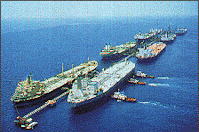|
|
OPEC
 |
Tankers load crude oil at Ras Tanura on the Arabian Gulf. |
The level of Saudi Arabia's oil production varies according to the state of the world oil market and the quotas of the Organization of Petroleum Exporting Countries (OPEC). In 1993, OPEC provided approximately 37 percent of world oil production, and Saudi Arabia supplied 12 percent of the world's needs. As a founding and principal member of OPEC, Saudi Arabia has assumed a leading role in guiding the organization as a constructive force for cooperation in energy issues. OPEC was set up in 1960 to unify petroleum policies among its members throughout the world and to ensure stability in international oil markets by eliminating unnecessary and harmful fluctuation in oil prices. OPEC strives to protect the interests of its members and is dedicated to maintaining an economical and reliable supply of petroleum to consuming countries. Another goal of OPEC is to provide a fair return on capital for investors in the petroleum industry.
As OPEC's largest producer, Saudi Arabia realize the importance of a stable global economy, and has therefor acted as the organization's principal moderating force. Over the years, the Kingdom has helped to prevent market crises that promised to harm both oil producer and consumers. As an example, during the Gulf Crisis of 1990-91, global markets were deprived of approximately four million barrels per day of crude oil supplies from Iraq and Kuwait. Saudi Arabia immediately responded by increasing production, thereby averting what could have been a disastrous shortfall in world supplies .
|